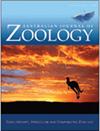Maternal care and juvenile development of captive-bred short-beaked echidnas (Tachyglossus aculeatus acanthion) at Perth Zoo, Western Australia
IF 1
4区 生物学
Q3 ZOOLOGY
引用次数: 0
Abstract
Abstract. Successful breeding of short-beaked echidnas (Tachyglossus aculeatus acanthion) occurred at Perth Zoo on eight occasions between 2007 and 2012. Here we report the methods used for monitoring and managing breeding females and their young from hatching through to weaning. Growth and development of the young during burrow-life was quantified through regular weighing and maternal care was monitored using video camera surveillance. All young hatched between early August and mid-September and were deposited in nursery burrows in October–November at 58–63 days of age at an average mass of 295 ± 64.3 g. Mothers suckled their young, on average, every 3.3 ± 1.1 days. Young first emerged from their nursery burrow from mid-January into February at an average 169 ± 21 days of age and weighing 1674 ± 511 g, and reached 3 kg in mass at 348 ± 97 days of age. Sexual maturity of two female offspring was attained at 4 years of age. Our observations of maternal care and development of the captive-bred young are consistent with published observations made on wild echidnas. We suggest that important factors for the successful rearing of captive-bred echidnas are enclosure set-up, daily monitoring, combined with a suitably designed and managed nursery burrow that provides a suitable substrate and microenvironment.西澳大利亚珀斯动物园圈养短喙针鼹(Tachyglossus aculeatus acanthion)的母性照顾和幼崽发育
摘要2007年至2012年间,珀斯动物园有8次成功繁殖短喙针鼹(Tachyglossus aculeatus acanthion)。在这里,我们报告了用于监测和管理从孵化到断奶的繁殖雌性及其幼崽的方法。通过定期称重来量化幼鼠在穴居生活期间的生长发育情况,并使用摄像机监控产妇护理情况。所有雏鸟于8月初至9月中旬孵化,10 - 11月在58-63日龄时,平均质量为295±64.3 g。母亲平均每3.3±1.1天哺乳一次。幼体于1月中旬至2月首次出穴,平均年龄为169±21日龄,体重为1674±511克,348±97日龄体重为3公斤。两只雌性后代在4岁时性成熟。我们对母性照料和圈养幼崽发育的观察结果与已发表的对野生针鼹的观察结果一致。我们认为,圈养针鼹成功饲养的重要因素是围场设置、日常监测以及设计和管理合适的苗圃洞穴,以提供合适的基质和微环境。
本文章由计算机程序翻译,如有差异,请以英文原文为准。
求助全文
约1分钟内获得全文
求助全文
来源期刊
CiteScore
2.40
自引率
0.00%
发文量
12
审稿时长
>12 weeks
期刊介绍:
Australian Journal of Zoology is an international journal publishing contributions on evolutionary, molecular and comparative zoology. The journal focuses on Australasian fauna but also includes high-quality research from any region that has broader practical or theoretical relevance or that demonstrates a conceptual advance to any aspect of zoology. Subject areas include, but are not limited to: anatomy, physiology, molecular biology, genetics, reproductive biology, developmental biology, parasitology, morphology, behaviour, ecology, zoogeography, systematics and evolution.
Australian Journal of Zoology is a valuable resource for professional zoologists, research scientists, resource managers, environmental consultants, students and amateurs interested in any aspect of the scientific study of animals.
Australian Journal of Zoology is published with the endorsement of the Commonwealth Scientific and Industrial Research Organisation (CSIRO) and the Australian Academy of Science.

 求助内容:
求助内容: 应助结果提醒方式:
应助结果提醒方式:


